
Law & Literature
metrics 2024
Transforming Legal Narratives into Literary Critique.
Introduction
Law & Literature, published by Routledge Journals, Taylor & Francis Ltd, is a pivotal journal at the intersection of legal studies and literary analysis. With an ISSN of 1535-685X and an E-ISSN of 1541-2601, this journal caters to a diverse audience, including researchers, practitioners, and students interested in the complexities of law and its representation in literature. Operating from the United Kingdom, it has made significant contributions to the field since its inception in 1989 and continues to thrive with contributions that explore the dynamic relationship between legal narratives and literary texts. Though classified in the Q4 quartile in Law category and holding a Scopus rank of 564 out of 1025, its unique focus ensures it remains a critical resource for understanding how narrative shapes legal discourse. While not an open access journal, its objective is to facilitate interdisciplinary dialogue by presenting innovative scholarship that probes the legal implications of literary works, thereby enriching both fields. For those invested in the paradigm of law through a literary lens, Law & Literature stands as a vital platform for engaging discussions and influential insights.
Metrics 2024
 0.11
0.11 0.40
0.40 0.40
0.40 13
13Metrics History
Rank 2024
Scopus
JCI (Web Of Science)
Quartile History
Similar Journals

Taller de Letras
Connecting Scholars through Literary ExplorationTaller de Letras is a renowned academic journal published by the Pontificia Universidad Católica de Chile, specifically from the Faculty of Letters. With an ISSN of 0716-0798, this journal holds a significant position in the field of Literature and Literary Theory, enjoying a commendable Q2 quartile ranking as of 2023. It operates under the auspices of a prestigious institution, promoting high-quality scholarly discourse within its scope, which spans a wide array of literary studies. Although the journal does not offer Open Access, its contributions are pivotal for researchers, professionals, and students seeking to enhance their understanding of contemporary literary trends and theories, establishing a critical dialogue within the literary community. With coverage extending through a converged lifespan from 2011 to 2024, Taller de Letras continues to be a valuable resource for those engaged in the vibrant fields of literature and criticism.

CRITICA LETTERARIA
Engaging Scholars in the Art of Literary CritiqueCRITICA LETTERARIA is an esteemed literary journal published by Paolo Loffredo Iniziative Editoriali SRL that has been contributing to discussions in the field of literature and literary theory since its inception in 2009. With an ISSN of 0390-0142 and an E-ISSN of 2035-2638, this journal is indexed in Scopus, ranking in the category of Arts and Humanities under Literature and Literary Theory. It is classified in the Q4 quartile, indicating its dedication to serving a niche yet vital discourse within the broader literary community. Although currently not open access, the journal offers a platform for scholars, researchers, and students to engage with diverse literary analyses and theoretical advancements. Located in the vibrant city of Naples, Italy, CRITICA LETTERARIA aims to foster academic dialogue and promote innovative approaches in literary studies, making it an important resource for anyone passionate about navigating the complexities of literary narratives and theory.

MISSISSIPPI QUARTERLY
Unveiling New Perspectives in Cultural DiscourseMISSISSIPPI QUARTERLY, published by Johns Hopkins University Press, is a distinguished journal that delves into the realms of Cultural Studies and Literature and Literary Theory. Since its inception, the journal has served as a vital platform for scholarly exchange and critical analysis, making significant contributions to understanding literary and cultural phenomena through varied interdisciplinary approaches. With an ISSN of 0026-637X and an e-ISSN of 2689-517X, it operates without Open Access, ensuring a selective dissemination of high-quality research. Despite being positioned in the Q4 quartile based on the 2023 ranking, it maintains a unique appeal for researchers, professionals, and students seeking to navigate the complexities of culture and literature. The journal has converged its publishing years to remain relevant amid evolving academic discourses, ensuring that it continues to address contemporary challenges and themes in literature. As an important academic resource, MISSISSIPPI QUARTERLY promises to stimulate discussion and provoke thought, inviting new voices to contribute to the ongoing dialogue in these critical fields.
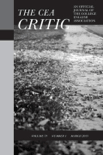
CEA CRITIC
Advancing insights in education and literature.CEA CRITIC, published by Johns Hopkins University Press, is a reputable journal that contributes significantly to the fields of Education, Literature, and Literary Theory. With an ISSN of 0007-8069 and E-ISSN of 2327-5898, the journal has been a vital platform for scholarly discourse since its inception in 2002, reinforcing its commitment to advancing knowledge and critical analysis in literature and education through to 2024. Though currently indicated in Q4 quartile rankings, CEA CRITIC welcomes submissions that challenge established norms and explore innovative perspectives, making it an essential resource for researchers, educators, and students alike. As an important outlet for original research and in-depth reviews, this journal strives to foster a vibrant academic community by offering insights that resonate both within and beyond the classroom. Engage with CEA CRITIC to share your scholarly work and contribute to this evolving dialogue in contemporary education and literary studies.
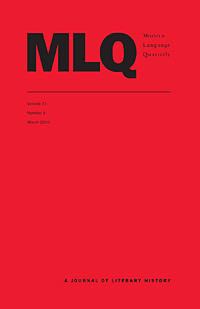
MODERN LANGUAGE QUARTERLY
Advancing Literary Scholarship with Precision and Insight.MODERN LANGUAGE QUARTERLY, published by DUKE UNIVERSITY PRESS, stands as a premier journal in the field of Literature and Literary Theory, recognized for its intellectual rigor and scholarly contributions. With an impressive Scopus ranking of #156 out of 1106 in its category, the journal showcases an 85th percentile standing, indicating its significant impact within the academic community. The journal, with ISSN 0026-7929, focuses on critical analysis, literary theory, and the intersection of language and culture, making it an essential resource for researchers, professionals, and graduate students alike. As it converges from 1996 to 2024, MODERN LANGUAGE QUARTERLY continues to uphold its tradition of excellence in literary scholarship, contributing to the advancement of knowledge and fostering a deeper understanding of literature's role in society. With its Q1 ranking in 2023, this journal represents the forefront of literary studies, providing a vibrant forum for the exchange of ideas and innovative research in the humanities.
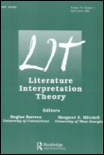
LIT-Literature Interpretation Theory
Exploring the Depths of Literary Theory.LIT-Literature Interpretation Theory is a premier academic journal that delves into the intricate relationships between literature and various interpretative theories, published by Routledge Journals, Taylor & Francis Ltd. With an ISSN of 1043-6928 and E-ISSN 1545-5866, this journal has established a notable reputation within the field, evidenced by its ranking in the 71st percentile among peers, and its placement in Q3 of the Literature and Literary Theory category for 2023. Since its inception in 1989 and continuing through 2024, LIT has aimed to provide a platform for the examination of literary texts through diverse theoretical lenses, catering not only to scholars and researchers but also to students and practitioners interested in literary discourse. Although it does not offer open access, the journal continues to be a vital resource for those seeking to enhance their understanding of literary theory within the arts and humanities. With robust insights and critical analyses, LIT contributes significantly to ongoing conversations in literature and promotes innovative interpretations that challenge conventional perspectives.
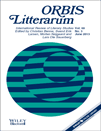
ORBIS LITTERARUM
Navigating the Rich Tapestry of LiteratureORBIS LITTERARUM, published by Wiley, is a prestigious journal in the field of Literature and Literary Theory, aiming to foster in-depth scholarly discussions and critical analyses of literary works and their theoretical underpinnings. With its ISSN 0105-7510 and E-ISSN 1600-0730, the journal presents a rich legacy that spans several decades, having converged its publishing efforts from 1943 to 1950 and from 1954 to the present day, thus ensuring a continuity of discourse in the literary field. Recognized for its high quality, ORBIS LITTERARUM is ranked in the Q2 quartile of literature disciplines as per the 2023 metrics, placing it within the top 26% of its category and earning a favorable position in the Scopus Rankings with a percentile of 74 in the arts and humanities. Researchers, professionals, and students alike are encouraged to contribute to this esteemed journal to engage with contemporary literary debates and to influence future scholarship in literature, enhancing understanding of texts across cultures and epochs.

JOURNAL OF MODERN LITERATURE
Connecting Literature and Culture in the Modern EraJOURNAL OF MODERN LITERATURE, published by Indiana University Press, is a distinguished peer-reviewed journal that delves into critical examinations of modern literary texts and theories. Since its inception, the journal has served as a vital platform for scholars dedicated to the exploration of contemporary literature, making significant contributions to the discourse within the field. With an impressive ranking of Q2 in the Literature and Literary Theory category as of 2023, it positions itself among the top-tier journals in its domain, reflecting its strong impact within academic circles. This journal not only fosters scholarly dialogue but also embraces innovative approaches to literary criticism, ensuring relevance in today’s dynamic cultural landscape. Researchers, professionals, and students will find a rich repository of articles that engage with various modern literary paradigms, enhancing their understanding and appreciation of the intricate relationships between literature and broader socio-cultural contexts. Though it does not operate under an open access model, the journal's extensive reach through its digital ISSN (1529-1464) and print ISSN (0022-281X) allows for valuable insights to be disseminated to the appropriate audiences.
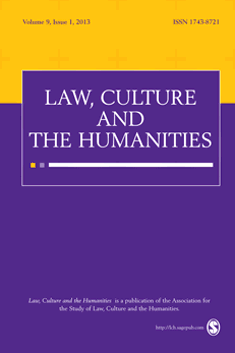
Law Culture and the Humanities
Cultivating Critical Perspectives on Law and CultureLaw Culture and the Humanities, published by SAGE Publications Ltd, serves as a pivotal forum for interdisciplinary dialogue at the intersection of law and the humanities. With an ISSN of 1743-8721 and an E-ISSN of 1743-9752, this esteemed journal has been contributing to scholarly discourse since its inception in 2005 and continues to do so until 2024. The journal carries a respectable impact factor showcased through its category rankings: Q3 in Arts and Humanities (miscellaneous), Q2 in Cultural Studies, and Q3 in Law. Its Scopus rankings reflect an impressive standing in the social sciences, particularly within Cultural Studies and Law, indicating that it is a fundamental resource for researchers and professionals aiming to explore the nuanced relationships between legal frameworks and cultural expressions. While not an Open Access journal, it offers substantial insights into contemporary debates, making it essential for academics and students engaged in the study of law's cultural dimensions.
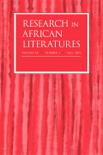
RESEARCH IN AFRICAN LITERATURES
Fostering Interdisciplinary Insights in African StudiesRESEARCH IN AFRICAN LITERATURES is a prestigious peer-reviewed journal published by Indiana University Press, dedicated to the critical exploration of African literary traditions, cultures, and texts. With an ISSN of 0034-5210 and an E-ISSN of 1527-2044, this journal stands out in the field of literature and literary theory, currently ranking in the 80th percentile of its category according to Scopus, making it a significant platform for scholars and researchers alike. Since its establishment, the journal has evolved through converged volumes from 2002 to 2024, consistently fostering innovative discourse and interdisciplinary approaches that illuminate the complexities of African narratives. Although it does not offer open access, the journal is integral for anyone engaged in African studies, providing critical insights that are essential for understanding the broader implications of literature within diverse cultural contexts. The journal's commitment to high standards of scholarship is reflected in its Q3 quartile ranking and its influential contribution to contemporary literary dialogue.